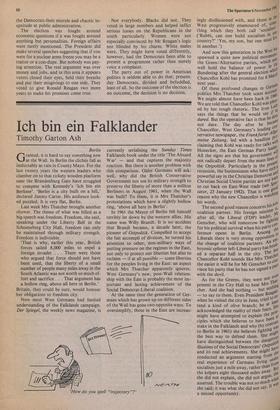Ich bin ein Falklander
Timothy Garton Ash
Berlin
Granted, it is hard to say something new at the Wall. In Berlin the cliches fall as ineluctably as rain in County Mayo. For the last twenty years the western leaders who clamber on to that rickety wooden platform near the Brandenburg Gate have struggled to compete with Kennedy's 'Ich bin ein Berliner'. 'Berlin is a city built on a hill,' declared Jimmy Carter. His audience look- ed puzzled. It is very flat, Berlin.
Last week Mrs Thatcher brought another shower. The theme of what was billed as a big speech was freedom. Freedom, she said, speaking under the Liberty Bell in the Schoeneberg City Hall, freedom can only be maintained through military strength. Freedom is indivisible.
`That is why, earlier this year, British forces sailed 8,000 miles to expel a foreign invader . . . There were those who argued that force should not have been used, that the liberty of a small number of people many miles away in the South Atlantic was not worth so much ef- fort and sacrifice . . . That argument has a hollow ring, above all here in Berlin.'
Britain, they could be sure, would honour her obligations to freedom city.
Now most West Germans had limited understanding of the Falklands campaign. Der Spiegel, the weekly news magazine, is currently serialising the Sunday Times Falklands book under the title 'The Absurd War' — and that captures the majority reaction. But there is another problem with this comparison. Older Germans will ask: well, why did the British Conservative Government not use its military strength to preserve the liberty of more than a million Berliners in August 1961, when the Wall was built? To them, it is Mrs Thatcher's protestations which have a slightly hollow ring, 'above all here in Berlin'.
In 1961 the Mayor of Berlin felt himself terribly let down by the western allies. His name was Willy Brandt. It is no accident that Brandt became, a decade later, the pioneer of Ostpolitik. Compelled to accept the fait accompli of division, he turned his attention to other, non-military ways of putting pressure on the regimes in the East, not only to protect our liberties but also to reclaim — if at all possible — some liberties for the peoples living in the East: an aspect which Mrs Thatcher apparently ignores. West Germany's new, post-Wall relation- ship with the East is probably the most im- portant and lasting achievement of the Social Democrat-Liberal coalition.
At the same time the generation of Ger- mans which has grown up on different sides of the Wall has gone two opposite ways. To oversimplify, those in the East are increas-
`How do you spell "trajectory"?'
The Spectator 6 November 1982 ingly disillusioned with, and those in the West progressively enamoured of, some: thing which they both call `socialism' ('Rabbi, can one build socialism in e2,,e, country?"Yes, my son, but one must 1”- in another.') And now this geneiation in the West /ft spawned a quite new political movente':, the Green/Alternativeparties, which tae well hold the balance of power in !h% Bundestag after the general election 4'11 Chancellor Kohl has promised for 6 Marc next year. Of these profound changes in Gerrnall politics Mrs Thatcher took scant accouat' We might almost have been back in I,9t We are told that Chancellor Kohl was Pi–d,. ed by her tough rhetoric. The Iron Lake says the things that he would say tfes dared. But the operative fact is that he a° c not dare. The day after he hecalli Chancellor, West Germany's leading c°"n . servative newspaper, the Frankfurter Allge. meine Zeitung, led with a headline Pr,cr, claiming that Kohl was ready for talks at Honecker, the East German Party leaci.,efii All the signs are that his government w'f not radically depart from the main lines ont the Ostpolitik. Particularly in the Presek"a recession, the businessmen who have stle",,d powerful say in the Christian Democrat a"ti Christian Social Union parties are not tec, to cut back on East-West trade (see SP:4i tator, 23 January 1982). That is one g„, reason why the new Chancellor is watching his words. The second good reason concerns his coalition partner. His foreign minister:r after all, the Liberal (FDP) Genscher, who will tomorrow be fights"n, for his political survival when his Pa-1.01°v ference opens in Berlin. Among 'to Liberals there is very strong oppositiortro the change of coalition partners. An ek. bryonic splinter left-Liberal party has h°,(:),,,s ed a separate hall in the city. The Chancellor Kohl sounds like Mrs Thatcn_',t the easier it will be for Mr Genscher to e°I' vince his party that he has not signed a Pad with the devil. As for the Greens, they were not evet, present in the City Hall to hear Mrs 11;ag cher. And she had nothing — but noth.,i'n — to say to them. Even President Reagan' when he visited the city in June, tried t°;st tend a kind of olive branch; he at le he acknowledged the reality of their fears. ?re might have attempted to explain the PrIat ciples which she believes to have beetlast stake in the Falklands and why (by e°11t,„1. as to Berlin in 1961) she believes fighting ."lit the best way to defend them. She Inigus have distinguished between the danger,°.,ik illusions of the Social Democrats' Ostpolhve and its real achievements. She might "the conducted an argument starting ft°111 et real experience of Germans living 11,°,4 socialism just a mile away, rather than lot the kelpers eight thousand miles awe' she she did not explain, she did not argue' ';,at asserted. The trouble was not so much was she said; it was what she did not say It w a missed opportunity.














































 Previous page
Previous page